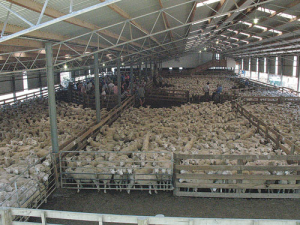Editorial: Happy days
OPINION: The year has started positively for New Zealand dairy farmers and things are likely to get better.
 NAWAC is satisfied with both the sheep and beef industries’ approaches to breeding with respect to animal welfare issues.
NAWAC is satisfied with both the sheep and beef industries’ approaches to breeding with respect to animal welfare issues.
The National Animal Welfare Advisory Committee (NAWAC) is satisfied with both the sheep and beef industries’ approaches to breeding with respect to animal welfare issues.
NAWAC’s role is to provide independent advice on animal welfare to the Minister for Primary Industries.
One subject of concern for the committee was the effects of selective breeding on the welfare of animals. NAWAC chair Dr Gwyneth Verkerk says they have worked with different sectors to understand their genetic selection parameters and how technology is being used.
In the paper just released, NAWAC gives an independent view on whether selective breeding practices used in New Zealand cause animal welfare concerns.
The report says Beef + Lamb NZ (BLNZ) sees an ethical approach to breeding as producing productive but resilient animals that handle the natural variation in feed supply and climate while producing high quality products in NZ’s range of farm environments.
“Improved longevity, calf survival and cow body condition score are the key to such resilience. In addition, control of inbreeding, which in the past led to the build-up of deleterious recessive genes and inherited diseases, emphasises the need to maintain genetic diversity,” the report says.
“Selective breeding has improved animal health in the beef cattle industry, notably selection for resistance to the facial eczema toxin and internal parasites. Selection for polled breeds obviates the need for disbudding/dehorning. Many of the negative effects of selective breeding have come from taking a narrow view of performance based on very few traits.”
BLNZ Genetics (a subsidiary of BLNZ) is doing research to develop suitable indices for a range of farming environments, the report says. These indices take a wide view of animal performance including growth, reproduction, health and disease traits. A beef progeny test similar to the central progeny test for rams is under development. Issues noted by the NZVA included:
• Elimination of several congenital diseases in Angus cattle
• Previously, heavy selection for meat production, such as the double muscling gene in Belgian Blue cattle, has produced negative outcomes such as dystocia (birthing difficulty) requiring surgical delivery of some calves.
Overall NAWAC is satisfied that the beef industry’s approach to selective breeding, focused as it is on the resilience of these animals in a variety of environments, is appropriate.
Broadly similar concerns occupy NAWAC in respect of the sheep industry.
“An ethical approach to breeding focuses on producing productive but resilient animals that handle the natural variation in feed supply and climate while producing high quality products in NZ’s range of farm environments,” the NAWAC report says.
“Improved longevity, lamb survival and ewe body condition score are the key to such resilience. In addition, control of inbreeding, which in the past led to the build-up of deleterious recessive genes and inherited diseases, emphasises the need to maintain genetic diversity.
“Selective breeding has brought significant improvements in animal health in the sheep industry, with selection for resistance to the facial eczema toxin and internal parasites. Identification of and selection away from deleterious individual genes has also been possible.”
An example is the condition Microphthalmia found primarily within the Texel breed and crosses made out of that breed, which results in blindness due to extremely small eyes – or no eyes, the report says.
Whereas in the past increased fecundity led to lower lamb survival, farmers can now select for improved lamb survival, setting a maximum reproductive rate they believe to be sustainable for their farming system.
“There has been considerable selection for increased growth rates and carcase leanness in sheep. On the other side of that, there is anecdotal evidence that the selection for leanness in slaughter animals has produced breeding ewes that have lower fat reserves, which can impact negatively during times when feed supply is restricted.
“Work is underway investigating increasing fatness in lamb carcases to improve eating quality.
“BLNZ Genetics sees that many of the negative effects of selective breeding have come from taking a narrow view of performance based on very few traits, and is doing research on animal welfare issues associated with selective breeding to develop suitable indexes for a range of farming environments. These indexes take a wide view of animal performance including growth, reproduction, health and disease traits.”
NAWAC says it is satisfied the sheep industry’s approach to selective breeding, focused as it is on the resilience of these animals in a variety of environments, is appropriate.
The World Wide Sires National All Day Breeds Best Youth Camp Best All Rounder plaudit has become family affair, with 2026 Paramount Cup winner Holly Williams following in her sister Zara's footsteps.
DairyNZ is giving New Zealand farmers a unique opportunity to gain hands-on governance and leadership experience within the dairy sector.
Herd improvement company LIC has posted a 5.2% lift in half-year revenue, thanks to increasing demand for genetics.
According to the latest Fresh Produce Trend Report from United Fresh, 2026 will be a year where fruit and vegetables are shaped by cost pressures, rapid digital adoption, and a renewed focus on wellbeing at home.
The Roar is a highlight of the game hunting calendar in New Zealand, with thousands of hunters set to head for the hills to hunt male stags during March and April.
OPINION: The past few weeks have been tough on farms across the North Island: floods and storms have caused damage and disruption to families and businesses.

OPINION: Meanwhile, red blooded Northland politician Matua Shane Jones has provided one of the most telling quotes of the year…
OPINION: This old mutt has been around for a few years now and it seems these ‘once in 100-year’ weather…